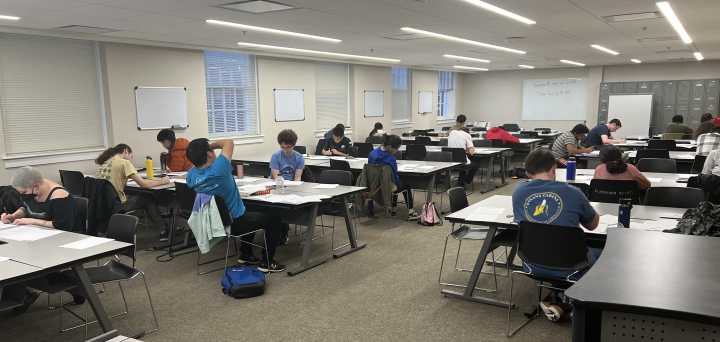UMD Students Win Fourth Place in Putnam Mathematical Competition
On a chilly Saturday in December 2022, 26 University of Maryland undergraduates made their way across campus to a large classroom in the John S. Toll Physics Building. Equipped with only pencils and scrap paper, the group participated in one of the toughest and most preeminent math contests for undergraduates in North America: the William Lowell Putnam Mathematical Competition.
Students took the six-hour written Putnam exam in the Physics building on December 3, 2022. Photo courtesy of Roohollah Ebrahimian.
The results were announced months later in February and UMD placed fourth—behind only MIT, Harvard and Stanford—out of 456 competing institutions. This is UMD’s best ranking in more than four decades.
“We were all thrilled with the amazing achievement of our Putnam team,” said Doron Levy, the chair of UMD’s Department of Mathematics. “This accomplishment reflects and significantly increases our ability to attract top talent to Maryland.”
The top three student scores from each institution are added together to determine the winning schools. Participants are assigned a score based on the quality and accurateness of their proofs and calculations. For the 2022 Putnam competition, computer science and mathematics double major Clarence Lam, mathematics major Isaac Mammel and mathematics major Daniel Yuan represented UMD, each ranking in the top 100 out of 3,415 participants.
“It’s a notoriously difficult exam. For context, the median score for the Putnam is usually either zero points or one point out of 120. Each member of this year’s team scored between 50 to 63 points out of 120,” explained Roohollah Ebrahimian, a principal lecturer in UMD’s Department of Mathematics and the university’s Putnam coordinator.
For the Putnam team members, their win came as a pleasant, yet unexpected, surprise.
“Honestly, I wasn’t expecting my results to be as good as they were, especially as this was my first time participating,” said Lam, who placed 87th. “There were so many extremely talented students in the competition, from my teammates to the other participants coming from schools like MIT and Harvard.”
Mammel, who placed 64th, echoed the sentiment: “I was also a little surprised, but I’m happy to see that I’ve improved since my first attempt at Putnam and I’m proud of UMD for coming so far.”
Yuan, the UMD team’s third member, ranked 46th in the competition. And although not on the UMD Putnam team, computer science major Philip Guo also placed in the top 200 individual scores.
Any UMD undergraduate can sign up for the competition, which is held every December. Putnam participants sit for an intensive six-hour written examination consisting of 12 complex math problems. According to Ebrahimian, who has coached UMD participants since 2016, test topics range from abstract algebra to calculus to probability.
To prepare students for the Putnam Competition and other collegiate math events, Ebrahimian teaches a one-credit fall course, MATH 299B: Putnam Express. In this class, students work through problems that were featured in previous Putnam competitions and share their individual approaches to solving the problems.
“It’s okay and perfectly normal to be wrong,” Ebrahimian explained. “The point of the class is to prompt students to exercise their logical reasoning skills and help them pull from all their experiences in their other math classes. They just need to know how to show what they’re thinking.”
Students are encouraged to present their solutions to their classmates and explain their logic—even if the solutions are unconventional, incomplete or even incorrect—to illustrate the need for diverse thought processes when tackling concepts.
“The prep class really fostered creative thinking and a sense of pride in our abilities, which I think is important for any math student,” Lam said. “I’ve been interested in Putnam since high school and for me, the class reaffirmed that competitive math could be fun. Everyone should give both the class and the competition a try because it really changes the way you look at math and problem-solving.”
Mammel, who took the course in fall 2021, credited the class as one reason why he participated in the Putnam Competition again.
“I learned how to be persistent, which is definitely important in this competition and something I advise for all math competition participants. Your first attempt may not pay off and maybe not even your second or third,” Mammel said. “But if you keep trying, you’ll have a shot at least with one problem or learn more about how to tackle it better.”
Ebrahimian is already looking forward to the next Putnam Competition and plans to increase outreach to potential participants, starting with high school students looking to enter the world of collegiate math competitions. He hopes that more students, including non-math majors, will sign up to test their skills and compete with other undergraduates who share a genuine love of math.
“We’ve really had some good turnouts in the past few years and usually rank in the top 10 or 15 participating institutions, but it was really exciting to see such a big jump in 2022,” Ebrahimian said. “The goal is now to maintain our momentum going forward.”
The article is republished from CMNS website.
The Department welcomes comments, suggestions and corrections. Send email to editor [-at-] cs [dot] umd [dot] edu.
